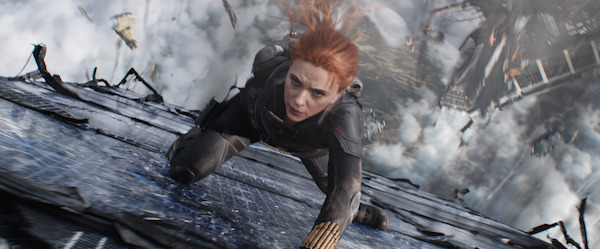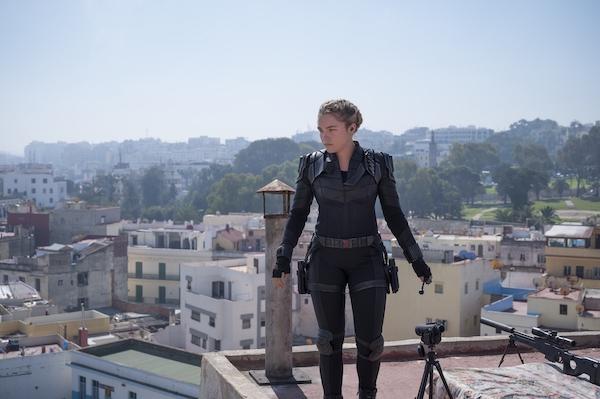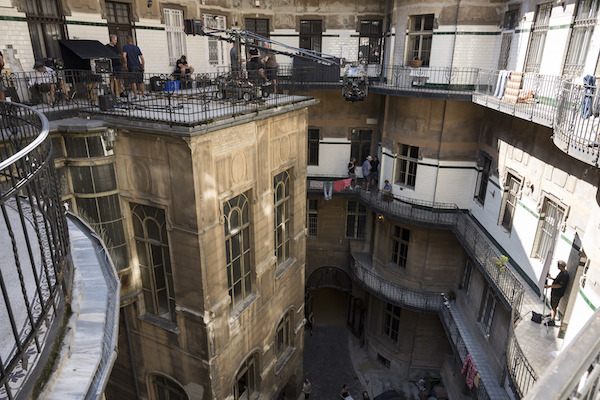Delayed by COVID-19, Black Widow arrives in theaters and online July 9 carrying the weight of the Marvel Cinematic Universe on its shoulders. No one could have anticipated that a pandemic would disrupt the movie industry for the past 16 months. It might have been easier to predict that Black Widow would fail to meet expectations.
As a superpower-less human teamed with superheroes, Natasha Romanoff has always been overlooked and undervalued. She’s been relegated to consoling, empathizing, encouraging her teammates, distracting villains until the “real” heroes can get it together, offering hints of emotion during downtimes between explosions and cataclysms. Then she offed herself in the kind of sacrificial gesture that in the comic book world usually brings about completely predictable resurrections.
Black Widow was supposed to come out in May, 2020, both a prequel and a sad coda to The Avengers: Endgame. The plan was for shows like WandaVision and Loki to dismantle the MCI, replacing it with new characters, narratives, and timelines. Appearing as it does now, Black Widow feels worn out, a repeat of other movies, devices, and tricks. Even the effects are tired.
Director Cate Shortland opens the film in a suburban Ohio neighborhood in a 1995 that more closely resembles 1957. Idyllic life with dad and mom Alexei and Melina (computer-enhanced David Harbour and Rachel Weisz) quickly turns into an episode of The Americans as the family flees US agents for Cuba and the protection of Russian mastermind Dreykov (Ray Winstone)
The main plot finds Natasha (played by Scarlett Johansson in a state of perpetual frustration) forced out of post-Captain America: Civil War hiding by the menacing supervillain Taskmaster (Olga Kurylenko). Meanwhile in Morocco, another Black Widow named Yelena (Florence Pugh) learns of a deadly conspiracy (are there any other kinds?) involving other Black Widows who have been programmed to take over the world.
Or something. Like viewers, their minds are controlled by others who may be hoping no one notices Black Widow‘s similarities to other films. Turns out Natasha and Yelena are sisters, or stepsister, or grew up together. Just like the Fast and Furious franchise, where family members become plot twists. Natasha and Yelena team up as they are attacked in an apartment in a scene that evokes Atomic Blonde without the crisp action. Then a Mission: Impossible chase that ends up in a subway, after a Taken interlude on rooftops.
This is Shortland’s first blockbuster, which may help explain the derivative action, wavering point-of-view, and disappointing effects. Grenades explode, bullets shred walls (but not people), bodies drop, cars flip, buildings collapse—just as they do in any number of action films. Black Widow is missing a voice, a vision, a distinctive take, despite efforts to make it “meta.”
What it has is the sheen of money, Marvel money, the kind that allows shooting in Norway, Budapest, Morocco, the Bahamas, Los Angeles, and Marvel Studios in Georgia, with tax credits from Australia, British Columbia, Ireland, New Zealand, Ontario, and Quebec.
Johansson’s okay without dominating the screen, leaving Harbour, Winstone and Weisz free to ham it up in the mistaken impression that they’re supposed to.
Critics have latched onto Florence Pugh’s performance as a sign that Black Widow isn’t completely bereft of life. After Fighting with My Family and Little Women, Pugh’s insolent shtick is wearing out, especially with a Russian accent. Yes, she teases Natasha about “posing” and has pithy putdowns prepared about her teammates. But what’s the point of joking about a movie you eventually embrace wholeheartedly?
It’s no fun attacking Black Widow. Everybody involved deserved better, except the corporate overlords who continue to devalue their golden egg.





